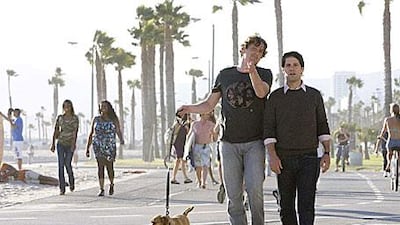CAIRO // An American film in which a dog belonging to one of the characters is named after the late Egyptian president Anwar Sadat has sparked outrage among the Egyptian public and Sadat's family, and prompted the government to demand an apology from the film's producers.
In the Hollywood movie I Love You, Man, one of the main characters, played by Jason Segel, tells his friend, played by Paul Rudd, that his dog's name is Anwar Sadat. A cross between a beagle and a pug, Segel says his pet is "the most beautiful dog in the world". When asked by Rudd whether this was because he admired Sadat's policies, Segel replies: "No, because they look exactly alike" before the camera zooms in on the dog. Sadat's picture was also posted on the dog's kennel in clips shown last week on Al Hayat, a private Egyptian channel.
"It's a grave and direct insult," Roqeya Sadat, Sadat's eldest daughter, said in an interview. "This is partially to be blamed on him not being valued as he deserves in his country, so it's natural that he would be humiliated abroad. "My father was the first Arab leader to win over Israel and brought the peace we still enjoy 28 years after his death. He is a war and peace hero - what else could he have done to be appreciated more here?" said Ms Sadat, 68, who has five sisters and a brother.
Sadat had initial victory in the war he waged on Israel in 1973, before peace talks were held between the two countries in 1978, which resulted in a peace treaty in 1979. He was assassinated during a military parade on October 6, 1981, by Islamist militants who opposed the peace treaty. Hossam Zaki, a foreign ministry spokesman, said that "either the film's writer was a boor or he wanted to insult Sadat" and demanded an apology from Dream Works Pictures, the company that produced the film.
Samir Sabry, Ms Sadat's lawyer, lodged complaints with the US Embassy in Cairo and the prosecutor general. On Wednesday he filed suits against the information minister to ban the movie in Egypt and confiscate all copies of it. A court date to hear the complaints has been set for September 1. "President Anwar Sadat remains one of the most respected leaders of the 20th century. His contributions to regional peace, his service to his country and his personal courage are the characteristics that his many admirers will always remember about him," said Margaret White, a spokeswoman for the US Embassy.
"We sympathise with those members of his family and with Egyptians who feel offended by this Hollywood movie, but the truth is that no fleeting reference in a film can or will detract from his legacy." I Love You, Man was distributed in Egypt with scenes featuring the dog cut out by the film company. The Egyptian censor, Ali Abu Shadi, said: "The company sent us the movie without those scenes. Had we seen them, we wouldn't have allowed a film that insults an Egyptian symbol to play in Egypt."
Egyptian commentators have variously criticised the film as being part of a broader negative portrayal of Arabs in American cinema and an insult to a national Egyptian icon. Others noted that calling or comparing someone to a dog is a grave insult in Arab culture, something that may or may not have been known by the film's producers. "Those scenes are horrific and racist," Abdullah al Sennawi, the editor of the opposition weekly Al Arabi, said in a phone-in to Al Hayat after it aired the scenes with the dog. "While dogs for the West don't have the degrading meaning that they have in Egypt, I ask the movie producers if they can make the same dog comparison with [former Israeli prime ministers] Golda Meir and Menachem Begin."
Ibrahim Nafie, the former editor of Al Ahram, Egypt's biggest state-owned daily, wrote in Friday's edition that the government had a duty to defend Sadat. "With all due respect to Roqeya Sadat and his family, Sadat is an Egyptian symbol and the Egyptian state has to shoulder the responsibility of defending him and preventing any insults against him." The film critic Tarek al Shenawi said naming the dog after Sadat was "a crime and very rude", and said such apparent criticism of the late president's appearance was "punishable by international laws".
This is not the first time Egypt has taken exception to a foreign production involving Sadat. Last year, Egypt's foreign ministry summoned the head of Iran's diplomatic office in Cairo to protest against the Iranian documentary Execution of the Pharaoh about Sadat's assassination, warning it could damage the already tense relations between the two regional heavyweights. Authorities subsequently closed the Cairo office of Iran's state-owned Arabic Al Alam television, which broadcast the documentary, though it was not shown in Egypt. The office has reopened, but there are ongoing cases demanding its closure again.
The Islamic Research Academy at Al Azhar, the highest Sunni institute of learning, based in Cairo, said at the time: "Issuing such an ugly movie is an outrageous crime, which violates Islamic Sharia. The rift [between Egypt and Iran] won't be bridged unless this silly film is burnt." Ms Sadat had filed a case against that movie too. "Nobody knows how I feel when I see such insults against my father, may God bless his soul. I'm the eldest [of his children]. I remember all his struggles - the time he spent in prison before the revolution, the October war, his peace efforts and assassination.
"He lived for Egypt and was killed for its sake. I'll defend him till the end." nmagd@thenational.ae

